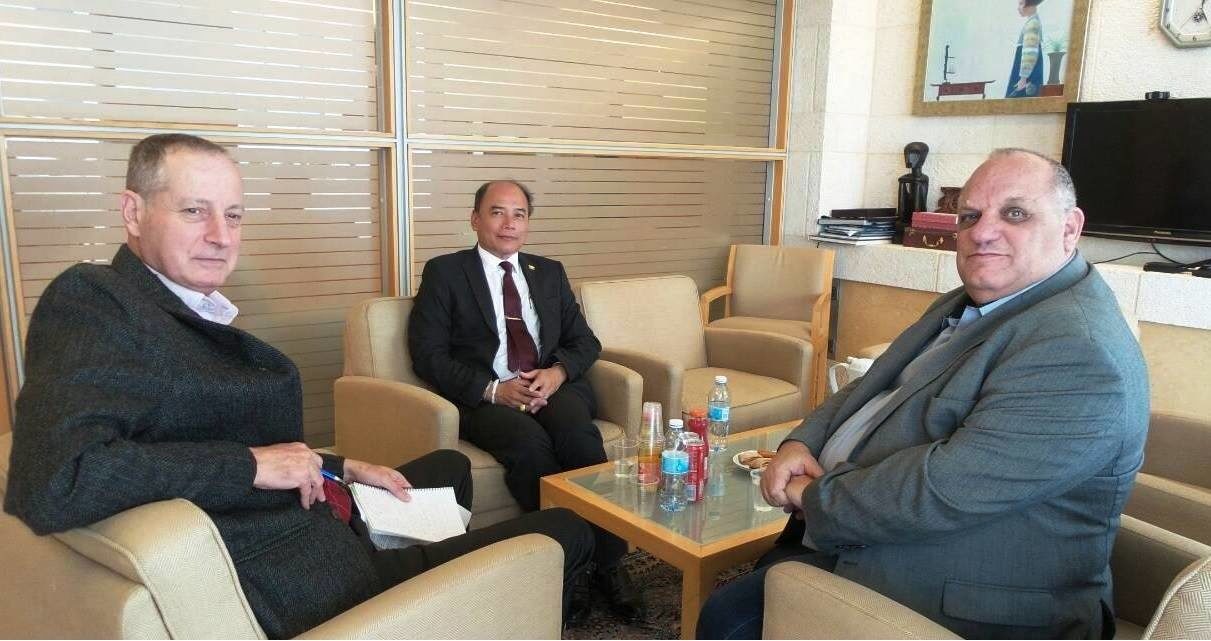The governments of Israel and Myanmar each issued statements late last week in response to a radio interview in which Myanmar’s ambassador to Israel apparently confirmed the signing of a new weapons deal between the two countries in the last 18 months.
In an interview with Galatz Radio on Thursday, Myanmar ambassador to Israel Maung Maung Lynn told host Yaara Agami Houry that the two countries have inked at least one new arms deal since he took up his post in August 2016.
“In 2015, our chief of defense forces visited your country. At that time, there was an arms contract already made. This is a very transparent [unintelligible] according to export and import requirements. So that’s why, in this case, it’s already finished. Maybe some cases are already finished and some cases are ongoing processes, but I’m not involved in this kind of contract because I had not [yet] arrived [in Israel],” Maung Maung Lynn said.
He went on: “So during my time, there is a new, another contract, according to my knowledge. Maybe the Myanmar government procured from your country, but [the weapons were] never involved in this Rakhine issue. This is only for standard army procurement to strengthen their military might in their own country according to the international law and standards.”
The ambassador’s comments can be heard in English from the 4:50 mark here:
Less than an hour after the interview aired, Israel’s foreign ministry announced that the ambassador had retracted his comment and apologized during a meeting with Gilad Cohen, the ministry’s deputy director-general for Asia and the Pacific.
“Israel does not sell arms to Myanmar,” the ministry said in a statement, which Galatz Radio immediately posted to its website alongside the audio story.
The ministry’s statement also mentioned that Maung Maung Lynn had been reprimanded a few days earlier for making similar comments. On November 16, when asked by an Israeli journalist why Myanmar needs so much military equipment from Israel, the ambassador responded: “Every national army needs to defend their country.”
Myanmar blames the media
On December 1, the Embassy of Myanmar in Israel released its own response to the interview. However, rather than simply affirming the ambassador’s retraction, the embassy blamed the gaffe on a combination of misleading editing, low audio quality, and Maung Maung Lynn’s imperfect English-speaking ability.
“One may hear about the idiom ‘lost in translation.’ This is what happened to this interview after all,” reads the embassy’s statement. “Having thoroughly reviewed the Hebrew interpretation and the original interviewee’s version of his own words and telephonic voice recording and English-language accent, which is not the mother-tongue of the interviewee have made a combined ill impact on the interviewer and the interviewee and those sniffing the smell of the news of Israeli arms sales to Myanmar quickly took up the wrong side of the interpretation.”
The statement goes on to say that when the ambassador is heard saying “So during my time, there is a new, another contract,” he was actually saying “there isn’t a new, another contract.”
As for Maung Maung Lynn’s apology and retraction, the Myanmar embassy said those were limited to his comments on previous arms sales, which “would make problem [sic]” for the two countries.
The embassy’s statement concludes by calling on Galatz Radio to “do a necessary amendment” for “unintentionally [committing] a mistake which has totally reversed the definition of the Ambassador’s answer and this led to the mess in the atmosphere of the media.”
A history of denial
This not the first time the Israeli government has had to publicly address allegations that it is supplying arms to the Myanmar military during its mass expulsion of Rohingya civilians, which began in August, following a series of attacks by the Rohingya insurgent group ARSA on police outposts, killing 11 security personnel. The military’s response has been branded ethnic cleansing by the UN and several foreign governments.
In October, the Israeli foreign ministry issued a statement saying it “vigorously denies false reports disseminated in the media regarding its alleged involvement in the tragedy in the Rakhine region of Myanmar.”
This statement came in response to reports that Israel sold advanced weapons to Myanmar during its ethnic-cleansing campaign. The reports were backed up by a Facebook post by the Myanmar Navy, which said it had received Super Dvora Mk III patrol boats from Israel in April 2017.
The Israeli foreign ministry’s statement also said the country’s policy of “supervising Israel’s defense exports is reviewed regularly according to various criteria, including the human rights situation in the target country, as well as the policy of the UN Security Council and other international bodies.”
Human rights attorney Eitay Mack, who is leading efforts in Israel to end arms sales to Myanmar, has pointed out that until Ambassador Maung Maung Lynn’s interview, the Israeli government has stopped short of declaring that it had completely frozen security exports to Myanmar.
“Apparently, the foreign ministry is not interested in issuing a statement that may obligate it,” he told the Jerusalem Post.
Last month, while meeting a group of rabbis who were advocating for an end to Israeli arms to Myanmar, a senior Israeli diplomat in New York said that both the Myanmar military and the Rohingya were “conducting war crimes.”
He also said that all Israeli arms sales take “into consideration human rights violations,” but refused to comment on Israel’s military ties to Myanmar.
In September, Israel’s High Court of Justice ruled on a petition to halt Israeli arms sales to Myanmar, but ordered that the decision remain secret.





Reader Interactions